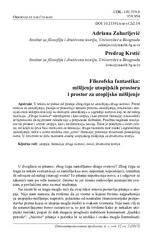Приказ основних података о документу
Filozofska fantastika: mišljenje utopijskih prostora i prostor za utopijsko mišljenje
Philosophical fantasy: thinking utopian spaces and the space for utopian thought
| dc.creator | Zaharijević, Adriana | |
| dc.creator | Krstić, Predrag | |
| dc.date.accessioned | 2018-01-16T16:12:49Z | |
| dc.date.available | 2018-01-16T16:12:49Z | |
| dc.date.issued | 2017 | |
| dc.identifier.issn | 0353-1589 | |
| dc.identifier.uri | http://rifdt.instifdt.bg.ac.rs/123456789/1426 | |
| dc.description.abstract | U tekstu se polazi od pitanja zbog čega se zamišljaju drugi svetovi. Pored motiva za zamišljanje, pažnja se posvećuje samom procesu zamišljanja, resursima i asocijativnim sklopovima koji su dostupni zamišljanju u izgradnji svetova koji se od našeg razlikuju. „Druge svetove“ određujemo i kao utopiju i kao prostor fantazije, rukovodeći se hipotezom da taj prostor nikada nije u potpunosti slobodan. Poseban naglasak stavljamo na prostor i vreme utopije, kao i na dimenziju novog. Tekst je podeljen u četiri celine, od kojih se prva bavi motivom za fantaziju; druga razmatra moć mašte i ograničenja zamišljanja; treća u svom središtu ima „cenu“ fantazije, potiranje složenosti postojećeg sveta. U četvrtom se delu razmatra značaj utopijskog mišljenja za društvenu teoriju. | sr |
| dc.description.abstract | The main question of this article is why imagine other worlds. In addition to shedding light on the motivation, we also examine the imaginative processes, their resources and the associative arrangements available to imagination in the construction of new worlds. We see ‘other worlds’ as both utopian and as fantastic spaces, following the hypothesis that the space of fantasy is never entirely free. We place particular emphasis on the space and time of utopia, and on the aspect of the novelty. The paper is divided into four parts. The first takes into account the path to the other world, or the methodical problem of imagination. The second wants to portray the other world, or the limitations to imagining something entirely different and new. The third part inquires about the cost of utopian thinking: what is lost in the process, what is sacrificed to its flattening gestures? Finally, despite all these limitations, in the fourth part we consider the significance of utopian thought for social theory. | en |
| dc.language.iso | sr | sr |
| dc.publisher | Beograd : Filozofski fakultet, Odeljenje za etnologiju i antropologiju | sr |
| dc.rights | openAccess | sr |
| dc.rights.uri | https://creativecommons.org/licenses/by/4.0/ | |
| dc.source | Etnoantropološki problemi | sr |
| dc.subject | utopija | sr |
| dc.subject | utopia | |
| dc.subject | fantasy | |
| dc.subject | other worlds | |
| dc.subject | novelty | |
| dc.subject | social theory | |
| dc.subject | fantazija | |
| dc.subject | drugi svetovi | |
| dc.subject | novo | |
| dc.subject | društvena teorija | |
| dc.title | Filozofska fantastika: mišljenje utopijskih prostora i prostor za utopijsko mišljenje | sr |
| dc.title | Philosophical fantasy: thinking utopian spaces and the space for utopian thought | en |
| dc.type | article | sr |
| dc.rights.license | BY | sr |
| dcterms.abstract | Крстић, Предраг; Захаријевић, Aдриана; Филозофска фантастика: мишљење утопијских простора и простор за утопијско мишљење; Филозофска фантастика: мишљење утопијских простора и простор за утопијско мишљење; | |
| dc.citation.issue | 2 | |
| dc.citation.volume | 12 | |
| dc.citation.spage | 641 | |
| dc.citation.epage | 663 | |
| dc.identifier.doi | 10.21301/EAP.V12I2.14 | |
| dc.type.version | publishedVersion | sr |
| dc.identifier.fulltext | http://rifdt.instifdt.bg.ac.rs/bitstream/id/2769/bitstream_2769.pdf | |
| dc.identifier.wos | 000408776500015 |

